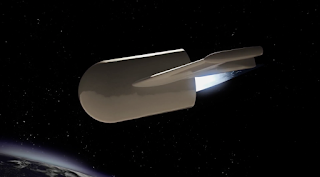Airbus says Adeline — short for Advanced Expendable Launcher with Innovative engine Economy — imposes a smaller performance penalty on its rocket than is the case for SpaceX’s reusable Falcon 9 first stage, all the while reusing 80 percent of the stage’s economic value — the engine, avionics and propulsion bay. Credit: Airbus video grab
LES MUREAUX, France – Airbus Defence and Space on June 5 unveiled the product of what it said was a five-year effort to design a reusable Ariane rocket first-stage engine and avionics package, a project company official said was stimulated by SpaceX’s work on reusable rockets. Airbus officials said they believe they have resolved some of the issues inherent in Hawthorne, California-based SpaceX’s reusability effort, notably the exposure of the first stage engine to high-speed stresses as it descends through the atmosphere to its landing zone. Airbus’s Adeline — short for Advanced Expendable Launcher with Innovative engine Economy — also imposes a much smaller performance penalty on its rocket than is the case for SpaceX’s reusable Falcon 9 first stage, all the while reusing 80 percent of the stage’s economic value — the engine, avionics and propulsion bay. Addressing a press briefing at the Airbus facility here, company officials said they had worked for five years, outside the Airbus campus, in secrecy to secure the patents needed for Adeline. Part of the work was done with sister company Airbus Military Aircraft, whose work on unmanned aircraft and other atmospheric vehicles was used in Adeline’s iterations. Airbus has openly said in recent months that it is seeking inspiration from Silicon Valley, with company Chief Executive Tom Enders leading the management team for a tour of the region earlier this year. More recently, Airbus created a $150 million venture capital fund, based in Silicon Valley, to develop a range of technologies. Adeline draws on the same inspiration. Benoit Isaac, Adeline project manager, said the small project team has been working out of a garage developing scale models of the Adeline vehicle — with two winglets and two rotary motors to guide the engine composite back to Earth for a horizontal landing on an airstrip — with a start-up mentality.
One company official said Enders had recently complained that SpaceX and its founder, Elon Musk, was generating favorable coverage worldwide for the Falcon 9 reusability work, whereas Airbus appeared to be standing still. “This is our way of showing that it’s not just America that knows how to innovate,” Isaac said. “We can innovate here in Europe as well and we want our 140,000 colleagues in the rest of Airbus to know about it.” Francois Auque, head of Airbus Defense and Space’s Space Systems division, cautioned that the company’s sole priority now was building the new-generation Ariane 6 rocket, an expendable vehicle scheduled to make its first launch in 2020. “Ariane 6 is our absolute top priority,” Auque said. “Adeline comes afterwards.” Ariane 6, financed by European Space Agency governments, is a direct European response to the SpaceX commercial challenge on launch pricing. The French space agency, CNES, has been looking at rocket reusability for many years, for the same reason as SpaceX: its promise of further cutting launch costs by recovering, refurbishing and reusing, multiple times, the high-cost elements of a rocket stage. Like SpaceX, Airbus concluded that a recoverable upper stage posed too many challenges given the distance the stage would have to travel to get back to the launch base. The focus then was on the first stage. SpaceX has begun efforts to return the entire first stage to an offshore barge, and ultimately to a point on land near the launch base.


No comments:
Post a Comment